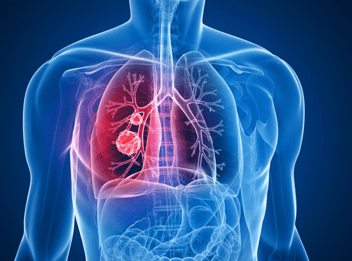
Most people do not experience lung cancer symptoms early in the disease but may notice signs if it spreads. However, lung cancer treatment is much more effective when the disease is in its early stages.
Lung cancer is the second most common type of cancer in adults in the United States. It is also the leading cause of death from cancer.
Some people experience subtle symptoms of early stage lung cancer, but these symptoms more often stem from other health issues or factors such as smoking.
Below, we describe early symptoms of lung cancer, as well as risk factors.
According to the American Cancer Society (ACS), most types of lung cancer do not cause symptoms until they have spread to other areas.
However, some people experience subtle symptoms during the earlier stages of the disease.
The early lung cancer symptoms described below usually result from some other cause. However, people who experience these symptoms should consider visiting their doctors as a precautionary measure.
Sudden weight loss
Weight loss without a clear explanation is a common lung cancer symptom.
A 2017 study of adults with lung or gastrointestinal cancer found that 34.1% of the participants had already experienced weight loss from their cancer when they received their diagnosis. Furthermore, weight loss before cancer treatment was linked to lower survival rates.
Cancer can cause weight loss for many reasons, including:
- a loss of appetite
- changes to immune function
- changes to metabolism
- changes to hormones
- side effects from chemotherapy, such as nausea and vomiting
- side effects from radiation therapy, such as difficulty swallowing
- reduced ability to absorb nutrients
Shortness of breath
Shortness of breath and wheezing can also be early symptoms of lung cancer.
Some people may experience a slight cough in addition to shortness of breath. Others may have difficulty catching their breath but have no cough.
Cough
A slight cough that does not go away after 2 to 3 weeks can indicate lung cancer. Some people may assume that this cough is only a result of smoking.
The level of coughing may not always be associated with cancer progression. According to a 2018 study neither smoking nor the stage of lung cancer was linked to severity of coughing in people with lung cancer.
A cough that produces blood may result from lung cancer or another issue with the lungs. Anyone who experiences this symptom should see a doctor.
Shoulder, chest, or back pain
Most people with lung cancer do not feel pain or other symptoms during the early stages. This is because there are very few nerve endings in the lungs.
However, pain can occur when lung cancer invades the chest wall, ribs, vertebrae, or certain nerves. For example, Pancoast tumors, which form at the very top of the lungs, often invade nearby tissues, causing shoulder pain.
As a tumor develops, a person may begin to feel pain in their:
- arms
- chest
- neck
Coughing or laughing may make the chest pain worse.
Hoarse voice
A person with lung cancer or another respiratory disease may develop a hoarse, raspy voice.
This can happen if a tumor presses on the laryngeal nerve, which is located within the chest. When the nerve is compressed, it can paralyze a vocal cord, causing the voice to change.
Risk factors for lung cancer
According to the Centers for Disease Control and Prevention (CDC), cigarette smoking is still the biggest risk factor for lung cancer, accounting for 80–90% of lung cancer-related deaths.
Other risk factors for lung cancer include:
- using other tobacco products, such as cigars or pipe tobacco
- inhaling secondhand smoke
- being exposed to radon gas, possibly from materials within the home
- working with dangerous chemicals, such as asbestos, arsenic, or diesel
- living in a highly polluted area
- having other lung conditions, such as chronic obstructive pulmonary disease
- having a family history of lung cancer
Some people experience subtle symptoms during the initial stages of lung cancer. It is important to recognize these because treatment is typically more effective when a person receives it early.
Anyone who experiences early symptoms of lung cancer should see a doctor. In many cases, something other than cancer is the cause. Still, it is best to seek medical advice as a precaution.

